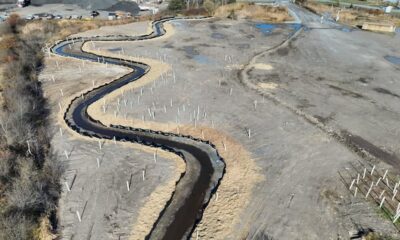Top Stories
WHO Declares Heat Crisis for Workers: Urgent Measures Needed Now

UPDATE: The World Health Organization has just declared that climate change-driven heat poses a “public health crisis” for workers worldwide, including in Canada. This urgent warning follows a joint report released by the WHO and the World Meteorological Organization today, highlighting the severe risks posed to outdoor workers in high-temperature sectors like construction and agriculture.
The report indicates that workers are facing increased dangers of heat stroke, dehydration, and even kidney dysfunction. In Canada, experts emphasize that the threat of extreme heat is not limited to traditionally hotter regions. “In Canada, we have these weather extremes. We go from cold to hot,” stated Glen Kenny, a research chair in environmental physiology at the University of Ottawa. He warns that this fluctuation makes Canadian workers particularly vulnerable.
The WHO’s director of environment, climate change, and health, Rüdiger Krech, emphasized the dire situation, stating, “The workers keeping our societies running are paying the highest price.” Vulnerable communities, particularly those lacking access to cooling resources, are at an even greater risk, as they face compounded health challenges.
The report reveals that heat exhaustion risks escalate when the core body temperature exceeds 38°C. It urges immediate action from governments and employers to implement heat-health plans. These plans should include provisions for regular breaks, hydration, and scheduling demanding tasks during cooler hours.
Employers are advised to adapt work intensity during high heat periods by reducing task speeds and incorporating more breaks. Workers should wear appropriate clothing that allows heat to escape while still adhering to safety standards.
Dr. Melissa Lem, president of the Canadian Association of Physicians for the Environment, notes the cognitive impairments caused by heat stress: “Workers’ cognitive functions can be impaired, leading to higher injury rates and decreased performance.” This concern highlights the need for a comprehensive approach to worker safety amid rising temperatures.
The buddy system is recommended to monitor colleagues for signs of heat stress. Symptoms such as fatigue, weakness, and dizziness should prompt immediate action—moving the worker to a cooler area and providing hydration. Severe heat exhaustion may manifest with slow reaction times and nausea, while heat stroke, a medical emergency, can lead to confusion and loss of consciousness.
Reflecting on her experiences, Dr. Lem recalled the devastating heat dome in British Columbia in 2021, which resulted in over 600 deaths, predominantly among the elderly. “Many of the additional people who became ill were likely workers,” she noted, underscoring the human impact of heat-related illnesses.
The WHO/WMO report stresses that adapting to climate change is essential for protecting workers, but it also calls for addressing root causes like greenhouse gas emissions. Reducing fossil fuel extraction could mitigate both heat and air pollution, further safeguarding worker health.
As this situation develops, immediate action from policymakers and employers is critical. The health of workers hangs in the balance amid rising global temperatures, and proactive measures are necessary to ensure their safety and well-being.
Stay tuned for more updates as this story unfolds, and consider sharing this urgent news to raise awareness of the critical health risks faced by workers in extreme heat conditions.
-

 Politics4 weeks ago
Politics4 weeks agoSecwepemc First Nation Seeks Aboriginal Title Over Kamloops Area
-

 World5 months ago
World5 months agoScientists Unearth Ancient Antarctic Ice to Unlock Climate Secrets
-

 Entertainment5 months ago
Entertainment5 months agoTrump and McCormick to Announce $70 Billion Energy Investments
-

 Science5 months ago
Science5 months agoFour Astronauts Return to Earth After International Space Station Mission
-

 Lifestyle5 months ago
Lifestyle5 months agoTransLink Launches Food Truck Program to Boost Revenue in Vancouver
-

 Technology3 months ago
Technology3 months agoApple Notes Enhances Functionality with Markdown Support in macOS 26
-

 Lifestyle3 months ago
Lifestyle3 months agoManitoba’s Burger Champion Shines Again Amid Dining Innovations
-

 Top Stories2 months ago
Top Stories2 months agoUrgent Update: Fatal Crash on Highway 99 Claims Life of Pitt Meadows Man
-

 Politics4 months ago
Politics4 months agoUkrainian Tennis Star Elina Svitolina Faces Death Threats Online
-

 Sports5 months ago
Sports5 months agoSearch Underway for Missing Hunter Amid Hokkaido Bear Emergency
-

 Politics5 months ago
Politics5 months agoCarney Engages First Nations Leaders at Development Law Summit
-

 Technology5 months ago
Technology5 months agoFrosthaven Launches Early Access on July 31, 2025





















